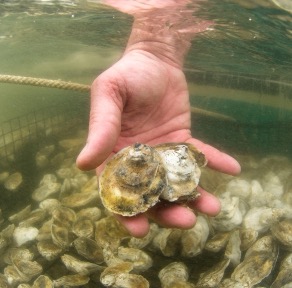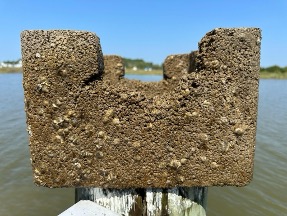Johnny Shockley, Co-Founder, Blue Oyster Environmental
Oysters have long been celebrated for their culinary delicacy, but their ecological importance should have a spotlight of its own. These remarkable shellfish are vital components in maintaining the health and balance of coastal marine ecosystems around the world. These bivalves are nature’s water purifiers, filtering vast amounts of water and enhancing marine biodiversity. Not only do oysters benefit our waterways, they play a crucial role in shoreline protection and nitrogen sequestration.

One of the most significant contributions of oysters is their ability to filter water. An adult oyster can filter up to 50 gallons of water per day, removing excess nutrients, sediment, and pollutants. This natural filtration process not only improves water quality, but also helps prevent harmful algae blooms that can devastate marine life. Furthermore, due to the filtration, oysters promote the growth of submerged aquatic vegetation, which in turn provides habitat for fish and other marine life.
Oysters also play a role in reducing nutrients within waterways, increasing both water clarity and quality. Eutrophication, a process that occurs when nutrients build up in waterways, causes large scale algal blooms. These algal blooms have negative impacts on those waterways by depleting oxygen levels and reducing sunlight penetration. Oysters are mother nature’s best defense against this phenomenon by consuming the algae from the water.
Oysters also play a crucial role in enhancing marine biodiversity. Oyster reefs create complex, three-dimensional structures that serve as habitat for a wide variety of organisms. These reefs provide shelter and breeding grounds for fish, crabs, and other marine life, supporting entire food webs and contributing to the overall health of the ecosystem.

Beyond their underwater contributions, oysters are instrumental in protecting shorelines from erosion. Oyster reefs act as natural barriers, absorbing wave energy and reducing the impact of storms and rising sea levels on coastal communities. This natural form of coastal defense is becoming increasingly important as climate change accelerates, threatening the stability of shorelines around the world.
At Blue Oyster Environmental, we recognize the vital role oysters play in sustaining our ecosystems and have built our business around supporting and amplifying their environmental impact. Through innovative solutions like integrating oysters into living shoreline sills, voluntary and compliance oyster reef restoration solutions and EcoDocks, we enhance the oyster population all while improving water quality and creating habitats that support diverse marine life. Our projects are designed not only to restore and protect oyster populations but also to engage communities in the process, fostering a deeper connection between people and the coastal environments they rely on.
In conclusion, while we know oysters are a delicious and important protein, they are our environmental champions that we should continue to rally behind.

As a third-generation watermen from Hoopers Island, Johnny Shockley crabbed and oystered on the Chesapeake for 30 years. Intrigued by the opportunities surrounding aquaculture, he launched Hoopers Island Oyster Company to create a sustainable oyster population and provide a new way forward for Maryland’s Watermen. In 2019 Johnny co-founded Blue Oyster Environmental to accelerate the growth of oyster aquaculture and the health of the Chesapeake Bay. In addition to Blue Oyster Environmental & Hoopers Island Oyster Co., Johnny serves on Maryland’s Agriculture Commission and MD’s Oyster Advisory Commission.



